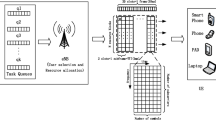Abstract
In this paper, we propose a quality of service (QoS) uplink scheduling algorithm for long term evolution (LTE) that collaborates with delay estimation. Unlike downlink scheduling, uplink scheduling cannot incorporate packet delay information due to specification constraints of LTE. The limited information results in difficulty ensuring QoS when conventional scheduling algorithms are employed. To overcome the limitation in QoS scheduling, we estimate delays taking into account buffer status reports (BSRs) of LTE and propose an uplink QoS scheduling scheme with delay estimation. For given system parameters, such as BSR period, an optimal parameter for estimation is also proposed and analyzed. Via simulations, we show that the proposed QoS scheduling scheme can reduce the number of unsatisfied QoS services by half, even with a simple estimation.








Similar content being viewed by others
Notes
A 3GPP LTE base station is called an eNB.
LTE Time Division Duplex (TDD) scheduling is similar to LTE FDD scheduling except that either the uplink or the downlink but not both is scheduled at every TTI.
A UE can use up to four logical channel groups in LTE. If the number of services is greater than four, then the services are categorized into four groups.
In implementation, the scheduler can check BSR arrival at a certain frequency, one TTI.
The slight deviation at 350 kbps is because delayed packets are dropped after three times PDB.
References
Kwon, S., & Lee, N. H. (2011). Uplink QoS scheduling for LTE system. In IEEE VTC 2011 Spring.
Motorola. Long Term Evolution (LTE): A Technical Overview. URL www.motorola.com/lte.
3GPP. (2012). TS 23.203 Technical Specification Group Services and System Aspects; Policy and charging control architecture.
Fattah, H., & Leung, C. (2002). An overview of scheduling algorithms in wireless multimedia networks. IEEE Wireless Communications, 9(5), 76–83.
Andrews, M., Kumaran, K., Ramanan, K., Stolyar, A., & Whiting, P. (2001). Providing quality of service over a shrared wireless link. IEEE Communications Magazine, 39, 150–154.
Shakkottai, S., & Stoylar, A. (2001). Scheduling algorithms for a mixture of real-time and non-real-time data in HDR. In 17th International teletraffic congress.
Anas, M., Rosa, C., Calabrese, F. D., Pedersen, K. I., & Mogensen, P. E. (2008). Combined admission control and scheduling for QoS differentiation in LTE uplink. In IEEE VTC 2008 fall.
Huang, J., Subramanian, V. G., Agrawal, R., & Berry, R. (2009). Joint scheduling and resource allocation in uplink OFDM systems for broadband wireless access networks. IEEE Journal on Selected Areas in Communications, 27(2), 226–234.
Delgado, O., & Jaumard, B. (2010). Scheduling and resource allocation for multiclass services in LTE uplink systems. In IEEE WiMob 2010.
Pradap, K. V., Ramachandran, V., & Kalyanasundaram, S. (2009). Uplink buffer status reproting for delay constrained flows in 3GPP Long Term Evolution. In IEEE WCNC’09.
Ericsson. (2006). 3GPP R2–061863: On the granularity of uplink scheduling in LTE.
Motorola. (2006). 3GPP R2–061915: Comparison of UL buffer reporting/scheduling schemes in LTE.
Sharma, M., & Lin, X. (2011). OFDM downlink scheduling for delay-optimality: Many-channel many-source asymptotics with general arrival processes. In 2011 Information theory and applications workshop.
Baid, A., Madan, R., & Sampath, A. (2012, May). Delay estimation and fast iterative scheduling policies for LTE uplink. In: WiOpt’12.
3GPP. (2011). TS 36.300 Evolved Universal Terrestrial Radio Access (E-UTRA) and Evolved Universal Terrestrial Radio Access Network (E-UTRAN); Overall description.
3GPP. (2012). TS 36.321 Evolved Universal Terrestrial Radio Access (E-UTRA); Medium Access Control (MAC) protocol specification.
Recommendation ITU-R M.1225. (1997). Guidelines for the evaluation of radio transmission technologies for IMT-2000.
Ross, S. M. (1996). Stochastic process (2nd ed.). New Jersey: Wiley.
Wemersson, M., Wanstedt, S., & Synnergren, P. (2007). Effects of QoS scheduling strategies on performance of mixed services over LTE. In IEEE PIMRC 2007.
Holtzman, J. M. (2001). Asymptotic analysis of proportional fair algorithm. In: IEEE PIMRC’01.
Author information
Authors and Affiliations
Corresponding author
Additional information
An earlier version of this paper was presented at IEEE VTC2011-Spring [1].
This work was supported by the National Research Foundation (NRF) of Korea Grant funded by the Korean Government (NRF-2012R1A1A1014312).
Rights and permissions
About this article
Cite this article
Lee, NH., Kwon, S. Uplink QoS Scheduling Algorithm with Delay Estimation for LTE Systems. Wireless Pers Commun 80, 1131–1146 (2015). https://doi.org/10.1007/s11277-014-2076-5
Published:
Issue Date:
DOI: https://doi.org/10.1007/s11277-014-2076-5




